Nísia Floresta

Nísia Floresta Brasileira Augusta, pseudonym of Dionísia Gonçalves Pinto, (October 12, 1810 in Papari, Rio Grande do Norte – April 24, 1885 in Rouen, France) was a Brazilian educator, translator, writer, poet and feminist.
She is considered the "first Brazilian feminist" and possibly the first still in the 19th. century to break through public-private boundaries by publishing her works in newspapers, when the local press was just beginning. She also coordinated a girls' school in Rio de Janeiro and wrote a book in defense of the rights of women, Native Americans and slaves.
Her first book, and the first in Brazil to deal with women's intellectual equality and their capacity and right to be educated and participate in society on an equal basis with men, was Women's rights and men's injustice (published in 1832).[1] It was a translation of Woman not Inferior to Man, often attributed to Mary Wortley Montagu.[2] It was reprinted twice.[3][4]
This book was originally considered to be a loose translation of A Vindication of the Rights of Woman by Mary Wollstonecraft, as Nisia Floresta herself had claimed, but in 1996 Maria Lúcia Garcia Pallares-Burke discovered that it actually was a translation of Woman not Inferior to Man.[5][6]
She also wrote three other books:
- Conselhos a minha filha (1842)
- Opúsculo humanitário (1853)
- A Mulher (1859).
See also
References
- ↑ Gender, Race, and Patriotism in the Works of Nísia Floresta, Charlotte Hammond Matthews
- ↑ South American Independence: Gender, Politics, Text, Catherine Davies, Claire Brewster e Hilary Owen, p. 29
- ↑ South American Independence: Gender, Politics, Text, Catherine Davies, Claire Brewster e Hilary Owen, p. 29
- ↑ Gender, Race, and Patriotism in the Works of Nísia Floresta, Charlotte Hammond Matthews
- ↑ South American Independence: Gender, Politics, Text, Catherine Davies, Claire Brewster e Hilary Owen, p. 29
- ↑ The book "Direitos das mulheres e injustiça dos homens" (Women's Rights and Men's Injustice) by Nísia Floresta: literature, women and 19th century Brazil, Isabela Candeloro Campoi, História magazine, 2011, vol.30, n.2, pp. 196-213
External links
- Works by or about Nísia Floresta at Internet Archive
- Book analysis at Scielo: Nísia Floresta, O Carapuceiro e outros ensaios de tradução cultural (in Portuguese) and (in English)
- nature, nurture and nation: Nísia Floresta's engagement in the breast-feeding debate in Brazil and France (in Portuguese)
- Nísia Floresta Brasileira Augusta: pioneira do feminismo brasileiro – séc. xix Constância Lima Duarte (in Portuguese)
- Works by Nísia Floresta at LibriVox (public domain audiobooks)
